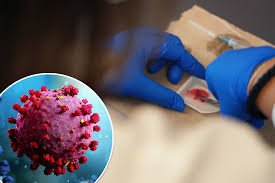London, Nov 23 – A groundbreaking study published in the Journal of Clinical Investigation has revealed an unexpected potential benefit of severe COVID-19 infection: it may contribute to shrinking cancer tumors. While this surprising discovery is based on research in mice, it offers new insights into the intricate relationship between the immune system and cancer, potentially opening the door to innovative cancer treatments.
The study focused on monocytes, a type of white blood cell essential to the body’s defense against infections. In cancer patients, monocytes are often hijacked by tumor cells to shield the cancer from immune attacks. Researchers found that severe COVID-19 infection induces the production of a unique type of monocyte with enhanced anti-cancer properties.
The Mechanism at Work
These “induced” monocytes, trained to combat the COVID-19 virus, retain the ability to attack cancer cells. Researchers identified a receptor on these monocytes that binds specifically to a sequence of COVID RNA, acting like a perfect “lock-and-key” fit, according to Dr. Ankit Bharat of Northwestern University.
In experiments, mice with advanced cancers—melanoma, lung, breast, and colon—were given a drug that mimicked the immune response to severe COVID-19, triggering the production of these specialized monocytes. The results were remarkable: tumors shrank across all cancer types studied.
Unlike regular monocytes, these induced cells retained their cancer-fighting properties and activated natural killer cells, which directly attacked the tumors. This mechanism bypasses the need for T cells, which are the focus of most current immunotherapies but are ineffective in many cases.
A New Approach to Cancer Treatment
This discovery presents a promising alternative to T-cell-based immunotherapies, which work in only 20-40% of cases. By leveraging a pathway independent of T cells, this mechanism could provide new hope for patients who don’t respond to traditional treatments.
Potential Implications
Although the study was conducted in mice, researchers believe the findings could pave the way for human treatments. Clinical trials are needed to confirm if this mechanism applies to humans and if it can combat other cancer types.
Importantly, COVID-19 vaccines are unlikely to trigger this effect since they do not use the full RNA sequence of the virus. However, the research opens the possibility of developing drugs or vaccines that specifically stimulate these cancer-fighting monocytes.
Trained Immunity and Future Research
The study highlights the concept of “trained immunity,” where the immune system adapts to one threat and becomes more effective against others. While severe COVID-19 infections remain life-threatening and should not be sought as a cancer treatment, the research provides valuable insights for developing safer, targeted therapies.
This study underscores how scientific exploration can lead to unexpected breakthroughs, even amidst a global health crisis. It not only advances our understanding of COVID-19 but also lays the foundation for potential new treatments for cancer and other serious diseases.
While much work remains before these findings can be applied to human patients, this research represents a significant step forward in understanding the interplay between viruses, the immune system, and cancer, offering hope for future therapeutic innovations

